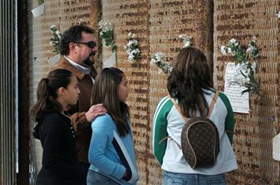 |
 |
 |
 News Around the Republic of Mexico | December 2005 News Around the Republic of Mexico | December 2005  
Mexico Retaliates for Border Wall Plan
 Mark Stevenson - Associated Press Mark Stevenson - Associated Press


| | Luis Cardenas, with his three daughters, reads a sign dedicated to a migrant who had died while crossing the U.S./Mexico border sometime this year, in Tijuana, Mexico. The sign and flowers had been placed on the Mexico side of the international border wall by human rights advocates to protest the soaring rate of migrant fatalities, which they cite to beefed up U.S. border security forcing migrants to take more dangerous options to enter the U.S. undocumented. (AP/David Maung) |
Mexico City — The Mexican government, angered by a U.S. proposal to extend a wall along the border to keep out migrants, has struck back with radio ads urging Mexican workers to denounce rights violations in the United States.

Facing a growing tide of anti-immigrant sentiment north of the border, the Mexican government is also hiring an American public relations firm to improve its image.

Mexican President Vicente Fox denounced the U.S. measures, passed by the House of Representatives on Friday, as "shameful" and his foreign secretary, Luis Ernesto Derbez, said Monday the wall was "stupid."

It's hard to underestimate the ill-feeling the proposal has generated in Mexico, where editorial pages are dominated by cartoons of Uncle Sam putting up walls bearing anti-Mexican messages.

Many Mexicans, especially those who have spent time working in the U.S., feel the proposal is a slap in the face to those who work hard and contribute to the U.S. economy.

Fernando Robledo, 42, of the western state of Zacatecas, says the proposals could stem migration and disrupt families by breaking cross-border ties.

"When people heard this, it worried everybody, because this will affect everybody in some way, and their families," Robledo said. "They were incredulous. How could they do this, propose something like this?"

Robledo, whose son and mother are U.S. citizens, predicted the measure "would unleash conflict within the United States" as small businesses fail for lack of workers.

He said many Mexicans felt betrayed by the anti-immigrant sentiment.

"We learned to believe in the United States. We have a binational life," he said of Zacatecas, a state that has been sending migrants north for more than a century. "It isn't just a feeling of rejection. It's against what we see as part of our life, our culture, our territory."

The government is scrambling to fight on two fronts. On Monday, it announced it had hired Allyn & Company, a Dallas-based public relations company to help improve Mexico's image and stem the immigration backlash.

"If people in the U.S. and Canada had an accurate view of the success of democracy, political stability and economic prosperity in Mexico, it would improve their views on specific bilateral issues like immigration and border security," Rob Allyn, president of the PR firm, told The Associated Press Tuesday.

Jose Luis Soberanes, head of the government's National Human Rights Commission, suggested Mexico go further.

"I would expect more energetic reactions from our authorities," Soberanes told local media. "It's preferable to have a more demanding government, more confrontation with the United States."

Mexico has also said it is recruiting U.S. church, community and business groups to oppose the proposal.

And the government has stepped up its defense of migrants, airing a series of radio spots here aimed at migrants returning home for the holidays.

"Had a labor accident in the United State? You have rights ... Call," reads the ad, sponsored by Mexico's Foreign Relations Department, which has helped migrants bring compensation suits in the United States.

The sense of dread connected with the measures is hardly restricted to Mexico. Immigrant advocacy and aid groups in the United States are worried about provisions of the House bill that upgrade unlawful presence in the United States from a civil offense to a felony.

"This is a sad foreshadowing," said immigrants rights activist Kathryn Rodriguez of the Derechos Humanos coalition in Tucson, Ariz. She fears the bill could expose those who help sick or dying migrants to criminal prosecution.

The House bill, passed on a 239-182 vote, would also enlist military and local law enforcement to help stop illegal entrants and require employers to verify the legal status of their workers.

Mexicans are outraged by the proposed measures, especially the extension of the border wall, which many liken to the Berlin Wall. Some are urging their government to fight it fiercely.

"Our president should oppose that wall and make them stop it, at all costs," said Martin Vazquez, 26, at the Mexico City airport as he returned from his job as a hotel worker in Las Vegas. "More than just insulting, it's terrible."

Associated Press reporter Victor Bermudez contributed to this report from Mexico City.

On the Net: http://presidencia.gob.mx/en/ | 
 | |
 |



